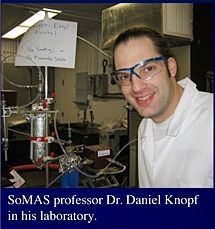 SoMAS professor Daniel Knopf was awarded the NSF Faculty Early Career Development Award (CAREER Award) for his proposal “Chemical Aging of Biomass Burning Aerosol by Heterogeneous and Photosensitized Reactions with Atmospheric Trace Gases.” The five-year $660,000 award is the most prestigious award given to junior faculty by the National Science Foundation.
SoMAS professor Daniel Knopf was awarded the NSF Faculty Early Career Development Award (CAREER Award) for his proposal “Chemical Aging of Biomass Burning Aerosol by Heterogeneous and Photosensitized Reactions with Atmospheric Trace Gases.” The five-year $660,000 award is the most prestigious award given to junior faculty by the National Science Foundation.
“Daniel’s research on heterogeneous chemistry and the fate of biomass burning aerosols addresses a timely and important topic,” said Dr. Minghua Zhang, associate dean of SoMAS and prior recipient of the NSF CAREER Award.
Dr. Knopf studies the properties of aerosol particles and the interactions with atmosphere. Aerosol particles- which play a key role in air pollution, cloud formation, and global warming- can react with constituents in the atmosphere by gas-to-particle reactions, called heterogeneous reactions, and undergo changes in their chemical and physical properties. “We do not currently fully understand what happens to aerosol particles during transport in the atmosphere,” said Knopf. “A better understanding of how aerosol composition changes in the atmosphere could alter our perspective on local pollution.”
“We use biomolecular tracers in particles to tell us about the corresponding particle emission strength for biomass burning. But we may be underestimating the contribution of those aerosols to local environments,” explained Knopf. “At present we assume that the amount of bimolecular tracer is proportional to the amount of biomass burning aerosols. However, a decrease in the measured quantity of tracer could be the result of gas-to·particle reactions that alter or break down the tracer, rather than the result of a true decrease in the amount or biomass burning aerosols.”
Knopf plans to use much of his NSF award to custom build a chemical ionization mass spectrometer, which will enable him to observe chemical reactions between aerosol particles and atmospheric constituents in the laboratory under atmospherically relevant conditions. He must build his own instrument because the changes he hopes to detect under atmospheric conditions are much smaller than those that can be discerned by commercial available machines.
Ultimately, Knopf hopes to explore whether the intensity and types of reactions between aerosol particles and the constituents of the atmosphere depend on the presence of solar radiation.
The NSF CAREER award is designed to recognize “teacher-scholar” and the recipients are selected based not just on the intellectual merit of their science but also on their plans to integrate education and research within the context of the mission of their Organization.
Knopf is passionate about sharing his enthusiasm for the atmospheric sciences with young people. He also prioritizes recruiting more minority students to the field. To this end, Knopf plans to bring motivated undergraduate students into this lab to work on projects that could lead to publications.
Plus he is working with Stony Brook University’s Department of Technology & Society to create an atmospheric sciences component in a summer program for high school students and teachers from high needs school districts.
“The recognition of Daniel by his peers and the NSF speaks of the quality of his research,” said Zhang. “We are extremely pleased that Daniel has built a first-class lab in such a short period time.”



